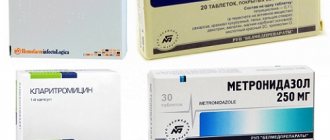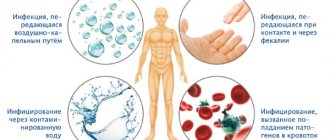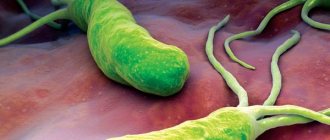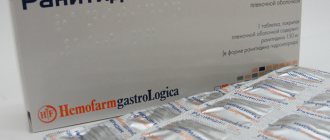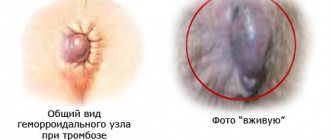Main
The Israeli RedHill Biopharma has proposed Talicia (omeprazole + amoxicillin + rifabutin, 10/250/12.5 mg) - a new combination drug intended for primary eradication therapy of Helicobacter pylori infection in adults. "Talisia" should be taken 4 capsules every 8 hours for 2 weeks. The new product has been approved by the US Food and Drug Administration (FDA).
The key component of Talisia is rifabutin, which became the first new antibiotic in more than ten years to be approved for the treatment of Helicobacter pylori infection.
Helicobacter pylori is a Gram-negative bacterium that is transmitted by the fecal-oral route and is present in the gastrointestinal tract (GIT) of more than half of humanity. H. pylori infection is a leading cause of upper gastrointestinal diseases such as chronic gastritis and gastric ulcers. It can lead to the development of gastric malignancies, including cancer and MALT lymphoma. And if previously the eradication of H. pylori was successfully carried out with combination regimens that included antibiotics such as clarithromycin, metronidazole or levofloxacin, now - due to the increasing multidrug antibiotic resistance - treatment is often unsuccessful, forcing a move to the next line of therapy.
Who is it shown to?
The following indications for eradication are distinguished:
- ulcer;
- poorly differentiated MALT lymphoma;
- gastritis of atrophic type;
- resection of the stomach due to the growth of malignant tumors;
- close relationship with people with stomach cancer.
Mechanism of action "Talisia"
In addition to the well-known proton pump inhibitor omeprazole and the antibiotic amoxicillin, Talisia contains rifabutin, a broad-spectrum antibiotic.
Rifabutin is primarily a bactericidal antibiotic. Rifabutin, being a semisynthetic derivative of rifamycin S (rifamycin S), has a high affinity for prokaryotic RNA polymerase (and very low affinity for mammalian RNA polymerase), and therefore it easily binds to the DNA-dependent RNA polymerase of bacteria, thereby inhibiting the synthesis their RNA.
Rifabutin has long been used in the treatment of tuberculosis and the prevention of infection of HIV patients with bacteria of the Mycobacterium avium complex. By the way, rifabutin is recommended for first-line treatment of tuberculosis, but rifampicin is prescribed to everyone due to the cheap price of the latter. For HIV-positive people, the advantage of rifabutin over rifampicin is that it has fewer drug-drug interactions and is therefore more suitable for people on highly active antiretroviral therapy (HAART).
Features of gastritis (gastroduodenitis) caused by Helicobacter pylori
- There is no seasonality of exacerbations.
- There is no periodicity of the disease (manifestations of gastritis are observed continuously).
- Frequent manifestations of dyspepsia symptoms: nausea, vomiting.
- Signs of infection may appear: low-grade fever, mild signs of intoxication, blood tests show a slight increase in the number of leukocytes, an increase in the erythrocyte sedimentation rate (ESR).
- Bad breath - halitosis.
"Talisia": effectiveness of Helicobacter pylori eradication
The ERADICATE Hp2 (NCT03198507) Phase III clinical trial (randomized, double-blind, placebo-controlled, international) enrolled adult patients (n=455) with previously untreated Helicobacter pylori infection, the diagnosis of which was confirmed by a 13C-urea breath test (UBT) and gastric biopsy (from the body and antrum of the stomach) for the presence of Campylobacter-like organism (CLO).
Participants were assigned to either standard therapy (1000 mg amoxicillin, 40 mg omeprazole) or experimental treatment (1000 mg amoxicillin, 40 mg omeprazole, 50 mg rifabutin) every 8 hours for 2 weeks. Since rifabutin could cause chromaturia (change the color of urine), all subjects additionally received riboflavin in order to maintain blinding that was fair for the protocol.
The primary endpoint of successful eradication of H. pylori (confirmed by negative UBT or stool antigen test results at least 28 days after completion of therapy) was achieved in 83.8% of patients (95% CI: 78.4–88.0 ) in the rifabutin group versus 57.7% of patients (95% CI: 51.2–64.0) in the standard therapy group. The difference between treatments was 26.1% (95% CI: 18.0–34.1), with a statistically significant difference in favor of rifabutin (p<0.001).
In the population of patients who strictly followed the course of treatment without skipping medications, the effectiveness of getting rid of Helicobacter in the rifabutin group was 90.3% (95% CI: 85.5–93.7) versus 64.7% (95% CI : 57.5–71.2) in the control group: difference 25.6% (95% CI: 17.7–33.7); p<0.001.
Rifabutin coped with the task of circumventing antibiotic resistance. Among patients with confirmed H. pylori resistance to antibiotics such as amoxicillin, clarithromycin, metronidazole, or their combinations, the rifabutin group demonstrated superiority over the standard Helicobacter eradication group: a significantly larger proportion of subjects got rid of it.
Purpose of the procedure
Eradication of Helicobacter pylori is a special method of treatment. It is aimed at creating a favorable atmosphere for the patient to carry out procedures. The technique has several goals:
- reduce the duration of treatment;
- create comfortable conditions for compliance with the regime;
- limit the number of types of drugs used - combination drugs are used;
- eliminate the need to follow a strict diet;
- prevent the development of side effects;
- speed up the healing of ulcers.
Ecadification is popular among doctors and patients due to its cost-effectiveness - inexpensive drugs are used, and effectiveness - the condition improves from the first days of therapy. The procedures pursue the following goals:
- reduce the number of medications taken per day - medications with a prolonged action and increased half-life are prescribed;
- overcome bacterial resistance to antibiotics;
- provide alternative eradication regimens in the presence of allergies, contraindications, or in the absence of treatment results;
- reduce the toxic effects of drugs.
Talisia and Helicobacter pylori eradication: a systematic review and meta-analysis
A systematic review and meta-analysis of 33 prospective clinical trials (conducted up to the end of February 2021) that tested rifabutin in the eradication of Helicobacter pylori found that the effectiveness of therapy with its use (in combination with a proton pump inhibitor and amoxicillin) was 73.2% ( 95% CI: 71.0–75.3) [I2=78.3, p<0.0001].
"Mosmedpreparaty"
Triple therapy based on rifabutin had an odds ratio (OR) of 1.40 (95% CI: 1.103–1.775) [I2=73.55, p=0.006] versus standard therapy.
The administration of rifabutin has proven to be clinically more successful in the following cases:
- as part of first-line therapy - versus reserve therapy (after failure of several lines): 82.4% (95% CI: 0.78–0.86, I2 = 27.44) successful eradication of H. pylori - versus 71.3% (95% CI: 0.69–0.74, I2=79.35) [p=0.0001];
- among the Asian population - vs. non-Asian: 81.0% (95% CI: 0.74–0.86, I2 = 57.66) - 72.4% (95% CI: 0.70–0.75 , I2=80.41) [p=0.001];
- intensified therapy (either daily doses of amoxicillin ≥ 3000 mg or proton pump inhibitor ≥ 80 mg, or treatment duration of 14 days) versus less aggressive: 80.6% (95% CI: 0.78–0.83, I2=71, 19) - 66.0% (95% CI: 0.63–0.69) [p=0.0001].
The incidence of adverse reactions in response to therapy with rifabutin was 25.3% (95% CI: 0.23–0.28), the OR compared with the control group was 0.79 (95% CI: 0.57–1 .09) [I2=61.58, p=0.15].
It should be understood that among the studies included in the meta-analysis, only one was randomized, double-blind, and tested the first-line prescription of rifabutin - all the others were less reliable and reliable. However, due to, firstly, the comparison of rifabutin with two-component therapy (omeprazole and amoxicillin), which is currently not recommended as a first-line option for successful eradication of H. pylori, and, secondly, the lack of comparison with four-component therapy (with or without bismuth ), which is recommended for regions with high resistance to clarithromycin, it is not possible to unambiguously recommend rifabutin for the first-line treatment of Helicobacter.
Treatment of Helicobacter pylori: review of trends
According to data from 21.5 thousand patients from the European registry for the treatment of Helicobacter pylori infection (Hp-EuReg), who underwent Helicobacter eradication between 2013 and 2021, first-line empirical therapy was characterized by heterogeneity, suboptimality and inconsistency, based on recommendations. It was noted that the chances of success increased with longer therapy, increased doses of proton pump inhibitor (PPI), and strict adherence to treatment.
More than 90% success was achieved with only three treatment regimens consisting of four components: PPI + amoxicillin + clarithromycin + metronidazole (tinidazole) - 14 days; PPI + bismuth + amoxicillin + clarithromycin - 14 days; PPI + bismuth + tetracycline (doxycycline) + metronidazole - 10 days. If there is a high level of antibiotic resistance in a given geographic region (especially with dual resistance to clarithromycin and metronidazole greater than 15%), the latter bismuth-containing regimen is preferred.
Updated analysis of data from 24.9 thousand patients of the Helicobacter pylori registry Hp-EuReg for the period 2013–2020. showed that the treatment effectiveness of first-line empirical eradication therapy increased from 85.3% to 91.3%.
Among the recorded trends: a decrease in the popularity of triple therapy, an increase in interest in the single-capsule combination drug Pylera (bismuth + tetracycline + metronidazole), a longer course of treatment, and an increase in the daily dose of PPI.
Additional materials
Instructions for medical use of the drug "Talicia" (Talicia, omeprazole + amoxicillin + rifabutin in the USA. [PDF]
Rifabutin-Based Triple Therapy (RHB-105) for Helicobacter pylori Eradication: A Double-Blind, Randomized, Controlled Trial. Ann Intern Med. 2021 Jun 16;172(12):795-802. [PDF] [source]
Rifabutin-Containing Triple Therapy (RHB-105) for Eradication of Helicobacter pylori: Randomized ERADICATE Hp Trial. Antibiotics (Basel). 2021 Oct 9;9(10):685. [PDF] [source]
Rifabutin triple therapy for first-line and rescue treatment of Helicobacter pylori infection: A systematic review and meta-analysis. J Gastroenterol Hepatol. 2021 Oct 10. [PDF] [source]
European Registry on Helicobacter pylori management (Hp-EuReg): patterns and trends in first-line empirical eradication prescription and outcomes of 5 years and 21,533 patients. Gut. 2021 Jan;70(1):40-54. [PDF] [source]



